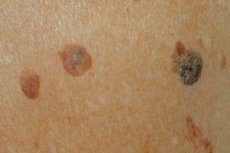Medical expert of the article
New publications
Senile keratoma
Last reviewed: 04.07.2025

All iLive content is medically reviewed or fact checked to ensure as much factual accuracy as possible.
We have strict sourcing guidelines and only link to reputable media sites, academic research institutions and, whenever possible, medically peer reviewed studies. Note that the numbers in parentheses ([1], [2], etc.) are clickable links to these studies.
If you feel that any of our content is inaccurate, out-of-date, or otherwise questionable, please select it and press Ctrl + Enter.

Senile keratosis is an age-related benign change in the skin in elderly people, which manifests itself in the form of pigmented rounded lesions up to several centimeters in diameter, which are covered with layers of horny epithelium. Senile keratosis lesions are most often located on the skin of the face, neck, hands and forearms. Sometimes malignant transformation of lesions into skin cancer is possible.
Pathogenesis
Symptoms senile keratoma
On exposed areas of the skin (face, neck, upper limbs) solitary or multiple lesions appear. First, erythematous spots appear, then limited hyperkeratosis develops in these areas. After the forced rejection of scales, pinpoint hemorrhages are formed. Scales invariably reappear and become dense.
Over time, protruding formations develop - dense plaques 1-1.5 cm in diameter, dark in color, round in shape, covered with tightly seated gray crusts. With prolonged trauma (scratches, insolation) or irrational treatment, they can become malignant in spinalioma or basalioma.
What do need to examine?
How to examine?
Differential diagnosis
Senile keratoma should be differentiated from verruca vulgaris, Bowen's disease, seborrheic keratosis, keratopapilloma, actinic keratosis, cutaneous horn, keratoacanthoma, eccrine poroma, follicular keratoma.
Treatment senile keratoma
Therapy of senile keratoses is a method of cancer prevention. Patients should be registered with a dispensary and undergo examination once every 6 months. Long-term intake of vitamin A in large doses gives good results. At an early stage, electrocoagulation, carbonic acid snow, liquid nitrogen, 25% podophyllin ointment, 5% fluorouracil ointment are recommended; if degeneration is suspected - surgical removal, as with epithelioma, with the capture of surrounding healthy skin; X-ray therapy.


 [
[